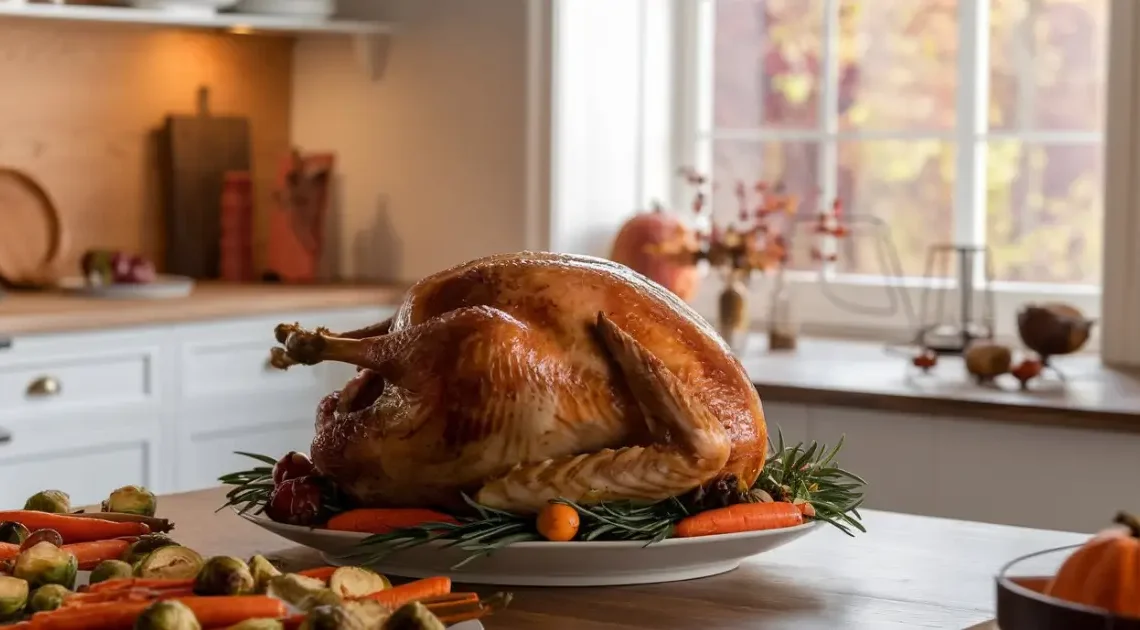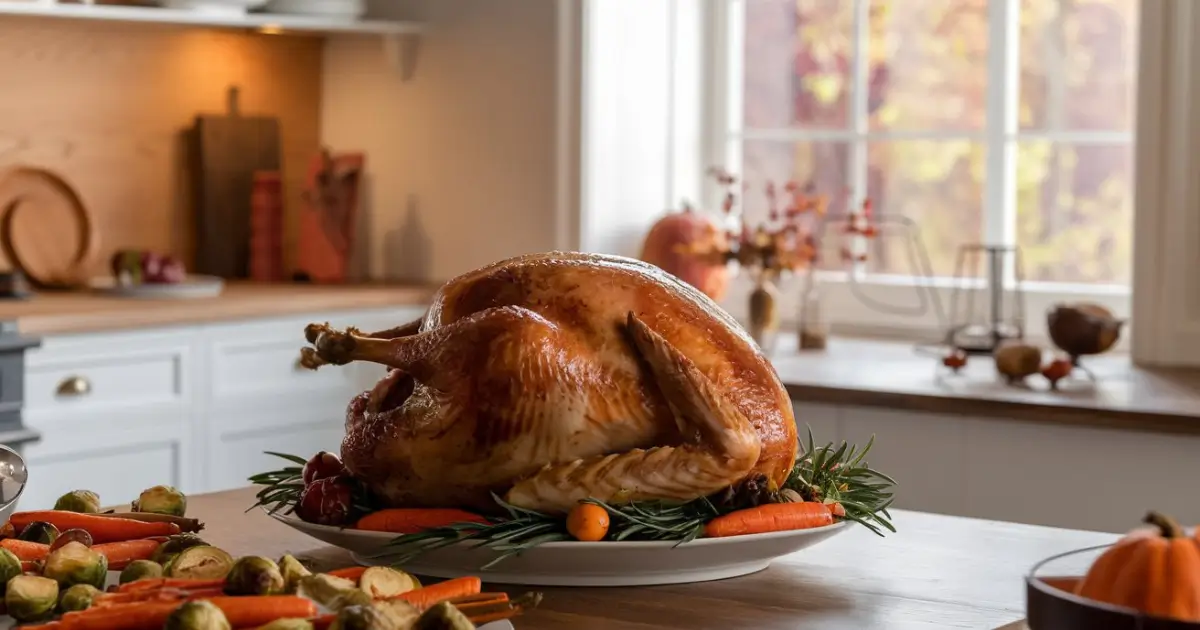
When it comes to holiday feasts or special gatherings, roasted turkey often steals the spotlight. But how can you take the classic roast turkey from good to extraordinary? The secret lies in the magic of herbs. Herb-infused roast turkey transforms a simple bird into a succulent, aromatic masterpiece. Infusing turkey with fresh herbs not only enhances its natural flavor but also fills the kitchen with mouthwatering aromas. Whether for Thanksgiving, a family gathering, or a Sunday dinner, an herb-infused turkey is the ideal way to impress your guests.
Table of contents
- The Art of Herb-Infused Roasting: What You Need to Know
- Selecting the Right Turkey for Herb Infusion
- Essential Herbs for Herb-Infused Roast Turkey
- Other Ingredients to Elevate Your Herb-Infused Turkey
- Preparing Your Herb-Infused Roast Turkey
- Cooking Methods for Herb-Infused Roast Turkey
- Achieving Perfectly Crispy Skin
- The Ideal Cooking Time and Temperature
- Flipping the Script: Herb-Infused Turkey Stuffing Ideas
- Side Dishes that Pair Perfectly with Herb-Infused Roast Turkey
- Leftover Herb-Infused Turkey Recipes
- You may also like
The Art of Herb-Infused Roasting: What You Need to Know
To fully understand the magic of herb-infused turkey, you must grasp the process of flavor infusion. This method goes beyond surface-level seasoning and penetrates deep into the meat.
Understanding the Flavor Infusion Process
When infusing turkey with herbs, the goal is to marinate the bird, allowing the herbs to permeate both the skin and the meat. This can be achieved by massaging a mixture of herbs, butter, and olive oil under the skin. Letting the turkey sit in a marinade for a few hours (or overnight) intensifies the flavor.
Key Herbs that Take Your Turkey to the Next Level
Some herbs shine particularly well in turkey roasts. Thyme, rosemary, sage, and garlic are not only flavor enhancers but also provide an aromatic depth. These herbs infuse the turkey with a rich fragrance and subtle flavors that transform each bite.
The Importance of Marinating and Seasoning
Marinating your turkey ensures the herbs infuse deep into the meat, not just the surface. Apply your herb mixture generously and let the turkey marinate for several hours to achieve the best results.
Selecting the Right Turkey for Herb Infusion
A great herb-infused turkey starts with the right bird. Here’s what to look for when selecting your turkey:
Whole Turkey vs. Turkey Breast
While both options are delicious, a whole turkey provides more surface area for the herbs to infuse. It also cooks more evenly, and the bones add richness to the broth, making it ideal for roasting.
How Size and Quality Affect the Final Result
Larger turkeys may take longer to cook, but they also yield more meat for infusing. Choose a turkey with good marbling for a juicy roast. Additionally, an organic or free-range turkey tends to offer richer flavor and better texture.
Essential Herbs for Herb-Infused Roast Turkey
To infuse a turkey with depth and complexity, choose the right mix of herbs. Here are the must-have herbs:
Thyme: This earthy, slightly lemony herb is a turkey staple, adding subtle yet persistent flavor.
Rosemary: A robust herb with pine-like notes, rosemary infuses the turkey with a bold fragrance.
Sage: Slightly peppery, sage adds depth and balance, especially when paired with thyme and rosemary.
Parsley and Oregano: These herbs add freshness and a bit of zest to the herb mix, cutting through the richness of the meat.
Garlic and Onions: Roasted garlic and onions create a savory, sweet base that enhances the overall flavor profile.
Other Ingredients to Elevate Your Herb-Infused Turkey
In addition to herbs, a few key ingredients will enhance the flavor and moisture of your roast.
Butter vs. Olive Oil
Butter adds richness, while olive oil offers a lighter base. A blend of both ensures optimal flavor distribution.
Citrus
Lemon or orange zest can brighten the earthy herbs, adding a refreshing contrast. Consider stuffing citrus slices inside the turkey cavity to infuse flavor from the inside out.
Salt and Pepper
Essential for bringing out the natural flavors of the turkey, salt and pepper are the foundation of any great seasoning mix.
Broth or Stock
To ensure the turkey remains juicy, add a bit of broth or stock to the roasting pan. This liquid also creates delicious drippings that can be used for gravy.
Preparing Your Herb-Infused Roast Turkey
Proper prep is key to a flavorful turkey. Follow these steps for success:
Step-by-Step Preparation
- Remove giblets and pat the turkey dry with paper towels.
- Rub the turkey skin with a generous amount of salt and pepper.
- Create a herb butter by mixing softened butter with thyme, rosemary, sage, garlic, and lemon zest.
- Gently lift the turkey skin and rub the butter mixture onto the meat.
- Stuff the cavity with additional herbs, citrus slices, and garlic.
- Truss the turkey by tying the legs together and tucking the wings underneath.
Marinating
Let your turkey sit with the herb butter for at least 2-4 hours, or preferably overnight, to allow the flavors to infuse the meat.
Cooking Methods for Herb-Infused Roast Turkey
There are several ways to roast a herb-infused turkey, each yielding a delicious result:
Roasting in the Oven
Roasting is the most common method, ensuring even cooking while allowing the herbs to meld with the turkey’s natural juices.
Smoking Your Turkey
For a deeper, smoky flavor, consider smoking your turkey. This slow method ensures a moist bird with a rich, aromatic profile.
Spatchcocking
Spatchcocking (or butterflying) the turkey involves removing the backbone so the bird lays flat, speeding up cooking and ensuring even flavor distribution.
Using a Rotisserie
A rotisserie guarantees even cooking on all sides, resulting in a crispy, golden exterior and moist, tender meat.
Achieving Perfectly Crispy Skin
Crispy skin is a hallmark of a great roast turkey. Here’s how to achieve that golden, crunchy exterior:
High Heat
Start by roasting your turkey at a high temperature (425°F) for the first 30 minutes to render the fat and achieve a crispy skin.
Basting
Baste the turkey every 30 minutes with its own juices to enhance flavor and maintain moisture.
Roast at Moderate Heat
After the initial high-heat phase, reduce the temperature to 350°F to finish cooking the turkey thoroughly.
The Ideal Cooking Time and Temperature
How Long to Roast Your Turkey for Optimal Flavor
Cooking time varies based on the size of the turkey. The general rule is about 13 minutes per pound for an unstuffed turkey, and 15 minutes per pound for a stuffed turkey. Here’s a quick guide:
| Turkey Weight | Unstuffed Cooking Time | Stuffed Cooking Time |
|---|---|---|
| 8-12 lbs. | 2hrs. 30mins | 3hrs. 15mins |
| 12-14 lbs. | 3hrs. 15mins | 3.hrs.45mins |
| 14-18 lbs. | 4hrs | 4hrs |
| 18-20 lbs. | 4hrs. 15mins | 4hrs. 30mins |
| 20-24 lbs. | 4hrs. 35 mins | 5hrs |
Internal Temperature
Check the turkey’s internal temperature. The breast should reach 165°F, while the thigh should be at 180°F for optimal doneness.
Resting Time
Let the turkey rest for a minimum of 20 minutes after roasting. This resting period allows the juices to redistribute throughout the meat, resulting in a more moist and tender texture.
Flipping the Script: Herb-Infused Turkey Stuffing Ideas
A flavorful stuffing can complement your herb-infused turkey. Consider the following:
Savory Stuffing with a Herb Twist
Use a combination of thyme, rosemary, sage, and sautéed onions for a stuffing that enhances the herb flavors in the turkey.
Roasting Stuffing Separately vs. Inside the Bird
Stuffing the turkey adds flavor but increases cooking time. Roasting the stuffing separately gives it a crispy texture while still absorbing turkey juices.
Side Dishes that Pair Perfectly with Herb-Infused Roast Turkey
The right sides will complement the rich flavors of your herb-infused turkey.
Roasted Vegetables
Root vegetables like carrots, sweet potatoes, and parsnips work beautifully with the herbs, offering a sweet contrast to the savory bird.
Herb-Infused Mashed Potatoes
Creamy mashed potatoes with hints of rosemary or thyme create the perfect pairing to the turkey’s flavor.
Gravy Made with Turkey Drippings
Don’t forget the gravy! Use the turkey drippings mixed with stock to create a savory sauce that enhances the flavor of every bite.
Leftover Herb-Infused Turkey Recipes
Make the most of your leftovers with these ideas:
Turkey Sandwiches and Wraps
Use leftover turkey in sandwiches or wraps with fresh greens and a tangy mayo.
Herb-Infused Turkey Soup
Simmer leftover turkey with vegetables and herbs to create a rich, comforting soup.
Turkey Salad
Shred the leftover turkey and mix with fresh herbs, greens, and a citrus dressing for a light, flavorful meal.


